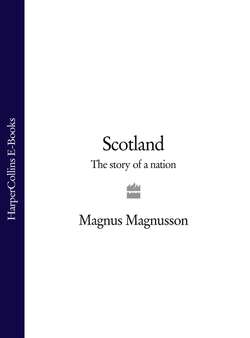Читать книгу Scotland: The Story of a Nation - Magnus Magnusson - Страница 63
Bruce and the spider
Оглавление… Bruce was looking upward at the roof of the cabin in which he lay; and his eye was attracted by a spider, which, hanging at the end of a long thread of its own spinning, was endeavouring, as is the fashion of that creature, to swing itself from one beam in the roof to another, for the purpose of fixing the line on which it meant to stretch its web. The insect made the attempt again and again without success; and at length Bruce counted that it had tried to carry its point six times, and been as often unable to do so. It came into his head that he had himself fought just six battles against the English and their allies, and that the poor persevering spider was exactly in the same situation with himself, having made as many trials, and been as often disappointed in what it aimed at. ‘Now,’ thought Bruce, ‘as I have no means of knowing what is best to be done, I will be guided by the luck which shall attend this spider. If the insect shall make another effort to fix its thread, and shall be successful, I will venture a seventh time to try my fortune in Scotland …’
TALES OF A GRANDFATHER, CHAPTER VIII
The story of the spider which refused to give up is the one thing which everyone knows about Robert the Bruce. Children are taught it at school; tourist guides tell it in every ‘Bruce’s Cave’ on their itinerary – all thanks to Sir Walter Scott. The ‘King’s Caves’ on Arran are a favourite spot for visitors. Another is the small island of Rathlin, a few miles off the coast of Antrim in Ireland, where Bruce seems to have spent at least part of the winter of 1306–7. But any cave will do – because the spider story simply is not, and cannot be, true. Sir Walter Scott did not invent it; but he certainly was the first person to father it on Robert Bruce.
The story had first appeared two hundred years earlier in a history of the Douglas family written by Hume of Godscroft. According to him it was James Douglas, the ‘Black Douglas’, Bruce’s greatest captain and the secondary hero of Barbour’s The Brus, who saw a spider – not Bruce. Douglas watched this spider trying to climb a tree (not the roof of a cave) with its web, and falling to the ground twelve times. When it tried for the thirteenth time it succeeded. Douglas then told the story to Bruce while he was a fugitive in the Hebrides, to encourage him to try, try and try again, even though he had already suffered twelve reverses in battle: ‘My advise [sic] is to follow the example of the spider, to poush forward your Majestie’s fortune once more, and hazard yet our persones the 13 tyme.’ It was a homily, a parable of leadership – and Scott lifted it and made Bruce, not Douglas, the central figure.1
No one now knows where Bruce spent the desperate weeks and months on the run in the winter of 1306/7. Some say the Western Isles. Some say the Northern Isles. Some say Ireland. Some even say Norway. When spring came, however, he burst into history again, apparently annealed and tempered by his ordeals, with his determination to succeed renewed. Perhaps Douglas’s story of the plucky spider, if not the spider itself, had revitalised his resolve.
When Robert Bruce emerged from hiding early in 1307, it was as a reinvigorated guerrilla leader; but his renewed campaign started disastrously. His first objective was to try to regain control in the south-west of Scotland. He mounted a seaborne expedition from Ireland, splitting his forces in two. One division, led by two of his brothers, Alexander and Thomas, headed for Galloway in eighteen galleys; but no sooner had they landed at Loch Ryan than they were overwhelmed by a local force commanded by Dougal MacDougall, a Comyn supporter. Bruce’s brothers were captured and dragged off to Carlisle, where they were hanged and beheaded.
Meanwhile Bruce himself, with his other brother Edward and James Douglas, landed on the Ayrshire coast near his birthplace, the castle at Turnberry. He found the countryside terrorised by the English occupation, and went to ground in the wild hinterland of Carrick. Bruce’s position was now worse, if anything, than it had been the previous autumn. Once again he was a fugitive king, a king whom no one apparently wanted, and his kingdom seemed more out of reach than ever.
